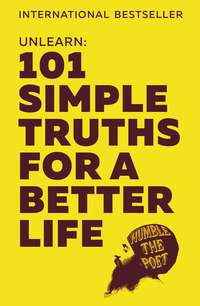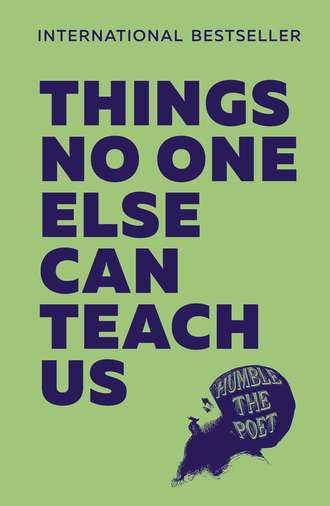
Полная версия
Things No One Else Can Teach Us
I stacked my life up with useless shit only because I forgot I wouldn’t be here forever. The important stuff was supposed to happen “after”—but after what? There is no better time to enjoy life than the present, because that present is all we have. We create imaginary timelines and assume we’ll still be here to see everything play out. Anne Marie’s words inspired me to reevaluate my timelines and priorities. I acknowledged that if something wasn’t bringing me joy, then it needed to take a back seat in my life.
People with serious health conditions, like cancer, have to shorten their timelines for the things they want in life. Goals can no longer be left to “someday,” because that day may never come. But this rule applies to us all; even eighty years is a short period of time in the grand scheme of things.
For people like Anne Marie, cancer lights a fire under them to value their time and spend whatever amount they have left on their own terms. It gifts them a perspective we all could benefit from: to focus only on the things that really matter to us and to abandon playing it safe. The sky is always painted beautifully before the sun sets, but we rarely make time to enjoy it, unless we plan an elaborate vacation to a sandy destination, pretending that the sun is somehow different there, more deserving of our attention.
Things aren’t black or white, good or bad, positive or negative—a lot of space exists in between, and when it comes to birth and death, our existence is that in-between space. While we’re alive the possibilities are enormous, but culture, society, and tradition have us thinking that life has to be lived a certain way. Will any of that matter if we remember our days are numbered? Sometimes it takes great loss to remind us of what we have. That loss also makes room for us to see more things that matter, like puddles. Anne Marie helped me see this, because although she prioritized the beauty of puddles, she still participates in life’s regularly scheduled programming—but she’s now doing it wearing a new set of glasses, finding beauty in all the small things while still getting the biggest things done. She doesn’t allow self-pity to prevent her from being in the game.
I don’t know what it feels like to have such a deadly disease. I’ve never had to take cocktails of medications just to get out of bed, and I haven’t lost my beard[1] to chemotherapy. Those experiences sound very difficult, and I wouldn’t dare disrespect these thrivers by even trying to imagine how it feels.
But you don’t have to get cancer to be a thriver; you can thrive right now. None of us is going to make it out alive, and remembering that helps to put things into perspective.
Cancer forced Anne Marie to remember she was going to die and inspired her to notice something as simple as the beautiful reflections in a puddle, which in turn reminds her that she’s still alive. If we all remember our mortality, we’ll find more in life to celebrate, and the things that cause us the most stress may lose a bit of strength.
A friend once said to me, “Our problems are only real because we forget we’re going to die.” I’m not going to ask you to be dramatic and assume that today is the last day of your life, so you can figure out what’s really important. We don’t need to stare death in the eyes to realize that. We just have to sit down for twenty minutes with a pen and pad and make a list of what’s important to us.
Sometimes when things feel too heavy, I ask myself, “Will this matter in three hundred years?” and I think about the fact that no one I know will be around then—none of their judgments, opinions, debts, or grudges—and that I should enjoy this journey while I’m still healthy enough to do so. In three hundred years it won’t matter that I wasn’t invited to this or that event or included on this or that list or was able to connect with this or that person. It won’t matter that I showed up wearing a mustard stain on my outfit or that I didn’t proofread my text message before I hit “send.” Figuring out what will matter in three hundred years results in a much shorter list—almost next to nothing.
It’s great to have ambitions for the future, but let’s add some short-term and immediate things to look forward to as well so we’re not deferring our entire life to “someday.” Let’s enjoy the puddles, our loved ones, and all the roses we’d like to smell. Anne Marie didn’t quit her day job and become a nihilist; she embraced life even more and dedicated more time to helping others do the same. She didn’t find a silver lining in her diagnosis; she discovered a puddle—and created one from it: after she was in remission, she founded TheseAreMyScars.com to share her cancer experiences to inspire and educate others.
I’m not going to pretend that staring at a puddle on the street engulfed forever me in a Zen state. I still stress over petty and impermanent things. But I have received renewed inspiration to take more control when those stresses become too much, and instead of drowning myself in a bottle, or pills, or another person, I dive into a puddle, and things feel a little better. A little better is a step up from a little worse, and those baby steps can add up, so splash your feet.
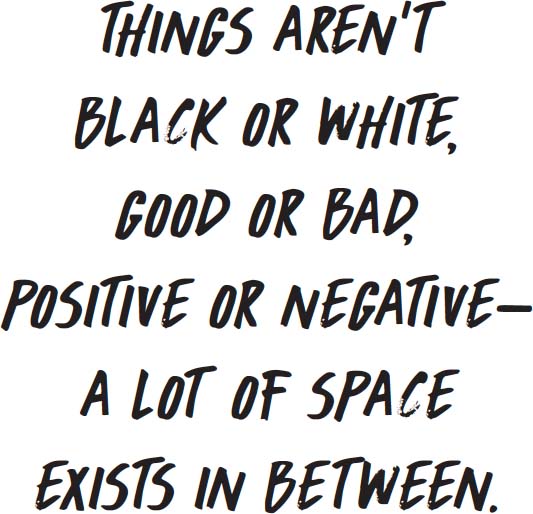
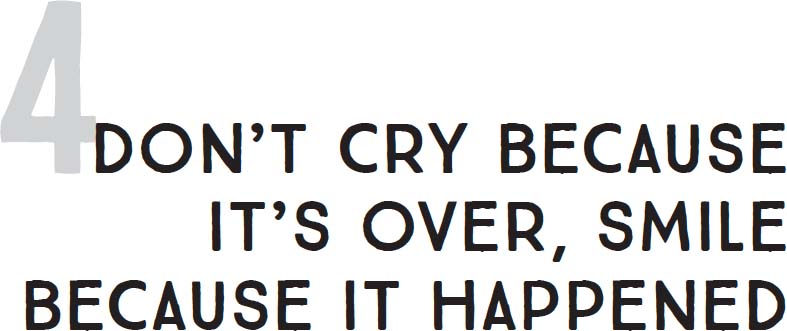
In the ninth grade, I put it out into the universe that I wanted a dog. A week later, I received a call from my uncle.
“Kanwer, I found a puppy for you,” he said.
“What’s the breed?” I asked excitedly. I had been researching different breeds for a while. Fourteen-year-old me was very particular about the type of dog I wanted.
“I don’t know … he’s black. Let me ask.”
I waited until he returned with an answer. “He’s a German Shepherd.”
“Does he come with any shots?”
“He comes with four legs, that’s all I know. Do you want a dog or not?”
“Umm, okay!”
And that’s how we got Himmatt. The owners of a gas station near my uncle’s home had purchased two very expensive German Shepherd show dogs and used them for security. Those guard dogs hooked up, and Himmatt was born in a litter of what I could only imagine were higher functioning puppies. My cousin, who had joined my uncle to visit the litter, explained that while the other dogs were running around play-fighting with each other, Himmatt sat quietly by himself staring at the floor. My uncle figured he’d be the least of a headache and chose him.
I was excited to get a puppy. I imagined him to be a cute and innocent little guy, but Himmatt was none of the above. He was all black with a little brown on his nose, and he was much larger than I expected an eight-week-old puppy to be.
Himmatt is a Punjabi word that loosely translates to courage and strength. He was goofy-looking and had oversized paws that he’d trip over as he walked. His ears drooped and never pointed in the same direction. When we were out on a walk together, people would stop their cars to get a closer look and pet him. They’d tell stories of their former dogs as they searched for them in his eyes. At the time I thought these people were weird and creepy, but the more it happened, the more I realized how easily dogs bring smiles into people’s lives.
Himmatt grew to be a large and handsome dog. He grew to 140 pounds and could jump and catch something six feet in the air. His show dog parents passed down show dog genes to him. He was a smart guy and knew enough to know when he didn’t have to listen. He knew who in my family would share dinner scraps with him. He knew the best routes for walks and would ignore anyone who wasn’t going where he wanted to go. He knew when to be nice to little kids and little dogs, and he knew he wasn’t allowed on couches, so he waited until we fell asleep to jump on them.
Himmatt grew up with us and was there for both of my sisters’ weddings. He had friends and enemies in the neighborhood, could sit on the porch without a leash, and was trustworthy enough to even leave the mailman alone.[1]
When he was ten years old, he developed problems in his hips and struggled to walk. We had been warned that this could happen with German Shepherds, but we had hoped we wouldn’t have to face this situation. First, he began to walk on only three legs, leaving one of his hind legs up. Then, the second hind leg started to give out as well, leaving him immobile. He would have accidents in the house, and we watched him deteriorate. German Shepherds have a life expectancy of nine to thirteen years, and, by the time he was eleven, the severity of his hip problems no longer allowed him any independence.
Just as I had researched information before getting a dog, I started researching what signs to look for when it was time to let him go. It’s extremely difficult to make a decision about another being’s life. I read heartbreaking stories from pet owners about their experiences with trying to figure out the “right” time—if that even exists. One person wrote that they asked their dog directly whether it was time, hoping for a sign. They said they felt that their dog gave them permission to let go, but more important, permission to forgive themselves.
Desperate, I began to talk to Himmatt. I asked him whether he thought it was time to go, but I didn’t get any type of response. I kept asking him over and over, crying, hoping for anything—a nod, a bark, a whimper, anything. His eyes would widen if I offered him ice cream or asked him whether he wanted to go for a walk. But when I asked him whether he thought he was going to be alright, if we should hold out hope that he remain with us a little longer, he just looked away.
One early morning, my father woke me up and said that Himmatt couldn’t get up anymore. He’d had another accident and was struggling to move. My father told me I needed to call the veterinarian and make arrangements.
That call was the heaviest thing I had ever dealt with, and in a painfully symbolic moment, Himmatt found the strength to get up and walk to the backyard while I was calling the vet. I hung up on the receptionist and ran to him. He sat there casually, as if everything was okay. I gave him a hug, and he groaned, letting me know that he wanted his space. Then he struggled to get up again.
I took a picture of him for the last time.
We went to the vet that afternoon, a place he always hated; it made him anxious and turned him—this giant dog—into a big baby. In hindsight I wished I had explored other options, like bringing the vet to the house and releasing Himmatt in a place where he was most comfortable. It still haunts me to see him on the cold steel table, whimpering, looking at me, wondering why I wasn’t helping him. I could have made his last moments better; he deserved that much. I failed him there.
When dogs are euthanized, they’re first given a drug that puts them to sleep, and then a second drug stops their heart. I hugged him and sobbed as he shook and whimpered.
I’m sorry I’m sorry I’m sorry I’m sorry I love you so much, I’m sorry!
Nothing else would come out, not a “goodbye,” not an “I’ll miss you,” only “I’m sorry.”
After the first needle, his whimpers began to fade, and his eyes got heavy. As they began to close, I got one final glimpse into them before the lights went out. He wasn’t putting up a struggle anymore, he just lay there, so still and so calm.
When the vet gave him the second drug, I screamed.
I’m sorry I’m sorry I’m sorry I’m sorry!
I buried my face into his and sobbed, his body still warm, fur still soft.
My guy, my buddy, my big dummy, I’m sorry I ever brought you here, I’m sorry you had to go like this!
He was gone.
I’m sorry, I’m sorry!
I spent eleven years with him, and it’s been eleven years since he’s been gone, and my eyes still well up with tears every time I think of him.[2]
To this day, I always stop to pet people’s dogs, and I tell the owners my stories of Himmatt. I’m always checking the dogs’ paws to see how big they’ll grow, always staring into their eyes, looking for my big dummy.
Once, I spotted a German Shepherd that looked exactly like Himmatt—so much so that I froze when I saw him, hoping he’d recognize me, hoping he’d come running to me, jumping at me, almost knocking me down every time. It felt too real to even go near him. My eyes filled with tears until I couldn’t see him anymore. I wiped away the tears and, as clear as day, I saw Himmatt in his eyes.
I promised myself never to get a dog again. Even if they live long and healthy lives, it’s still only a fraction of my own. That’s painful to know. Having to say goodbye to Himmatt was one of the hardest things I’ve ever had to do, and I’m starting to realize why.
Control.
We can’t control death; we can manage or delay it, but we can never outright avoid it. Even modern science focuses on lifespan over healthspan, as we create suffering just to avoid the inevitable. The thought of a new dog pushes me to the thought of those last moments, when I’ll have to make that decision again one day, to decide that a beloved dog no longer gets to exist.
Nicht weinen, weil sie vorüber!
Lächeln, weil sie gewesen!
[Do not cry because they are past!
Smile, because they once were!]
—Ludwig Jacobowski
This Dr. Seuss–esque idea has been floating around forever, but clichéd quotations lose meaning if we forget why they are clichés in the first place.
All of our relationships are seasons. Some last longer than others, and even at their best, a relationship will still change and fall. It’s our fear of not being in control that makes us bitter and greedy in the face of the truth that everything is temporary … including us. It’s an inconvenient truth that we never want thrown in our faces, so we do everything and anything to avoid or disguise it. Some chase legacies beyond their years, others lean on science, others on religion. Whatever it may be, all lives play out the same: we will lose others, and others will lose us.
Life is going to be full of tough decisions, and some questions will never have clear answers. Did we put Himmatt down too early? Could he have had a few more days? Who would have benefited from those few days? Did we wait too long? Such questions won’t deliver any answers that will bring peace to my mind. It happened, and should I choose to get another dog, it’ll happen again. The important question, the one we can answer through our actions is, Was having eleven years with Himmatt worth the pain of losing him?
The answer is an astounding, absolute yes. In my unapologetic, biased opinion, there are two types of people: those who love dogs, and those who haven’t owned a dog. It was an amazing experience, and like all experiences, it came to an end. The fact that it ended is one of the reasons it was so valuable. I learned responsibility, love, and affection and experienced the magic that is having a four-legged best friend.
Here’s why this matters: We will all suffer loss. It’s a guarantee in life. Some losses are easier to bear over time; others permanently affect who we are and the direction we move in life. But the pain of loss, much like the pain of anything, is a part of the natural cycle in this beautiful thing called life. Our fears tell us that we should avoid long-term enriching experiences because they may end in loss. But when we give in to those fears, all we do is close ourselves off to an endless well of magic.
I don’t know whether I’ll be able to open my heart again to a dog. I don’t know whether meeting that woman on a blind date will lead to a life-long relationship. I’m unsure whether devoting a year to writing a book is worth it. But fear won’t do anything other than hold me back from finding out.
I’m not here to promise you that everything will work out. I don’t own a crystal ball. That person you started dating may betray your trust next week, month, year, or fourteen years from now. That puppy you bought may drain your bank account with veterinary bills. Sharing your work with the public may blow up in your face. I’m not here to sell you affirmations. I’m here to remind you that despite all the things that can (and often will) go wrong, it’s worth going for it. Holding yourself back from experiencing life will leave stains on your spirit that may never come out.
Of course, sometimes, going for it has negative consequences. But I’ve always come out the other side. I have tattoos I don’t like—so what? I’ve spent my life savings on projects that failed—so what? I’ve loved with my eyes closed and was torn to shreds—but I’m still here. More important than my stories of surviving the worst-case scenarios are your stories. You’ve suffered and will continue to suffer loss, and often it’s out of your hands. But you do hold the power of deciding whether you can handle more loss and whether the journey is worth it despite the loss.
I cried writing this chapter because I miss Himmatt with all my heart. A new dog wouldn’t replace him; it would only be a new experience and adventure, with its own ups and downs, problems and solutions, beauty and horror. I’ve given myself permission to be fearful, but I won’t allow those feelings of fear to decide my actions moving forward. My fear of loss doesn’t have to stop me from having relationships with dogs that my friends’ live with or dogs I pass on the street.
For you, fear might mean taking that baby step toward a first date, or even having a conversation with your crush. Maybe it’s spending time in a new city, or actively searching out new people to connect with. We don’t have control over how 99.999999 percent of things turn out, but we’ll always have control over our efforts and our perspectives, and that counts for something. If we go in with an open heart toward the possibility of loss, then maybe the blow won’t feel so traumatic. As someone who’s NOT Winnie the Pooh once said: “How lucky am I to have something that makes saying goodbye so hard.”
All of our emotions have value, and as unpleasant as some are, they’re reminders that we’re alive and have a whole lot going on inside. Why not approach life with curiosity and wonder, instead of dread and fear. We don’t avoid movies because we know they’ll end. We enjoy the journey they take us on. Our journey is life, and no one makes it out alive; the finish is death, so let’s enjoy life while we can, with those we love, while they’re still here.
Eleven years with Himmatt was most definitely better than never having him at all. Every day was a gift, and now being grateful for that gift is my priority. It’s okay to make room for the fear and self-pity; just be mindful that they don’t overstay their welcome.
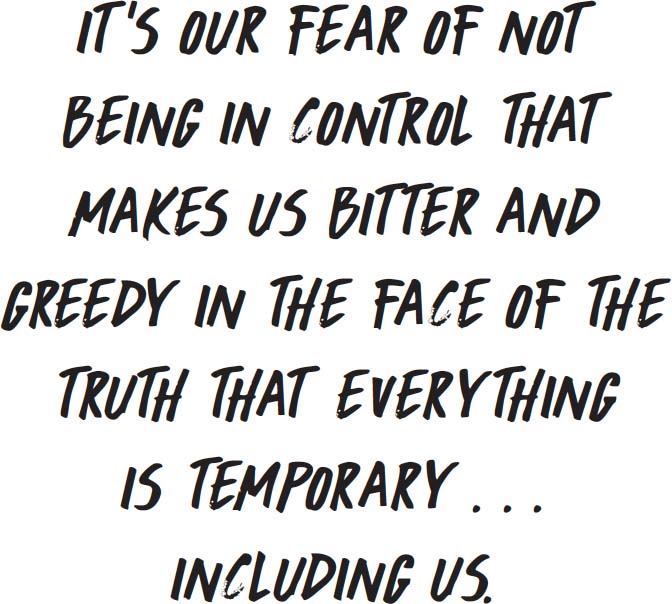
CLOSE
If things lasted forever, would we be able to appreciate them?
I’m writing this while I sit in first class flying to LA from NYC, eating a warm chocolate chip cookie, which was a great follow-up to Dessert Part 1: a hot fudge sundae. This is my first, and maybe last, time flying first class, and no, I didn’t pay for this ticket. To get it, all I did was agree to attend an event. I napped, watched a few reruns of 30 Rock, and ate every piece of food I was offered, because I don’t know whether this will ever happen again. I know that the people sitting beside me consider this an average day, and because of that, they don’t appreciate it the way I do.
I can appreciate this humble brag only because I’ve learned that as quick as it comes is as quick as it goes. The fact that nothing lasts forever is a double-edged sword, and we have to be careful. Just because nothing is going to last doesn’t mean we can abandon our responsibilities. Statistically speaking, if you’re reading this, then the odds are in your favor that you’ll be here for a solid three-quarters of a century, and that means you have to plan accordingly. Our circumstances last longer than our feelings, but it’s those feelings that have a massive impact on our circumstances. I’m only a kid in a candy store on this flight because I’m aware that this experience is a short, rare one and so I should make the most of it. Most of the wonderful things and people we have in our lives are just like this first-class flight: temporary, rare, and worth our highest levels of gratitude. Letting go is never easy when we get used to things.
This flight won’t last forever, and that’s important, because if it did, I wouldn’t appreciate it. Despite the comforts, extra accommodating flight attendants, and their magical ability to keep the ice cream cold, I wouldn’t want this flight to last forever. I want to have other experiences, and those will also come with an expiry date. The challenge is, we want the good stuff to last and struggle to believe that the bad stuff will ever end. The heartbreaks, regrets, pain of loss all seem to tattoo themselves into our beings, but just like this flight, they won’t last. Sometimes the only reason these feelings stick around is because we don’t let them go.
Nothing remains forever, and that idea scares and excites the shit out of me at the same time. It’s that rollercoaster of our life in the theme park we built, and it’s fun only because it makes us feel butterflies in our tummies. The glory of our victories and the disappointments of our defeats all become memories. When we realize this, we’re free to choose dread or gratitude when facing them. Gratitude is the only thing that will make us smile, so if smiling is your jam, lean in that direction.
Everyone wants to avoid the reality of death and how temporary everything is. We’re coded to survive, so it makes sense that we have our blockers on; it wouldn’t make for much of a life if we viewed everything as simply temporary, and thus not worth our time. But we don’t have to choose to see the world one way or the other. Life is a spectrum of experiences, and we can dance in between them, because between is all that matters. Life is what happens between birth and death—that little hyphen that shows up on our gravestones between our birthday and our death day. It’s the between that allows me to goof around and get work done on this comfortable six-hour flight. It’s that in-between period in life that opens up endless possibilities for what our lives can become.
One day the star we call our sun will burn out, the galaxy we call the Milky Way will fade, the universe we call home will cease to be, and there will be nothing. Before any of that happens, we’ll become nothing too, and that’s okay; it just means we should appreciate who and what we have, while we have them, for however long we have left.
I hope someone is reading this well after I’m gone and is scratching his or her head about what a first-class flight is.[1] I’ll take comfort in knowing my thoughts outlived the mind that manifested them, if only for a few extra millennia.
Exit
You won’t return like the sunrise
But I’ll feel your warmth
What did I do to deserve the few moments we had
I’m overwhelmed
When you brought me pain, you brought me rain
And a seed of wisdom came to sprout
Your voice vibrates with a half-life of infinity
Everything will be said, will be said forever
Until there’s no one left to hear it
And then it won’t matter
In a temporary world, it matters that you shared your temporary time with me
I’ll see you in forever
Enter



